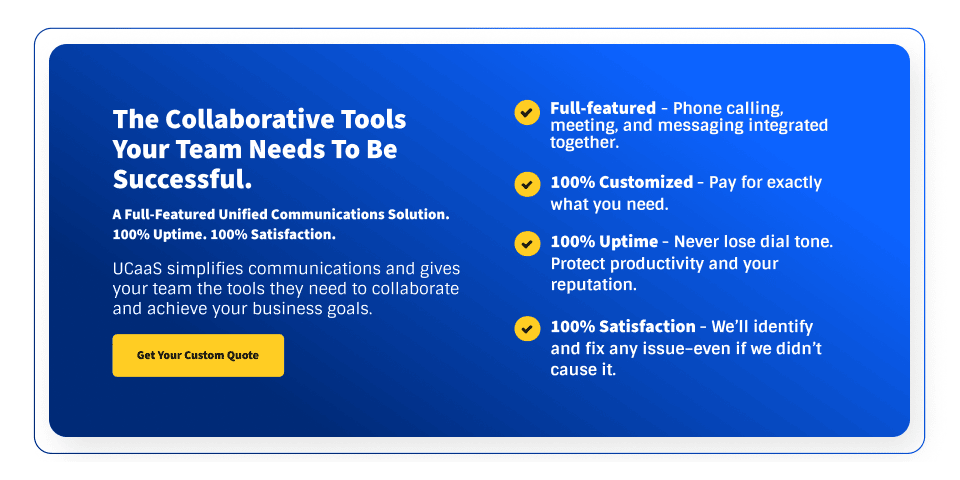Decrypting Unified Communications Pricing: 5 UCaaS Price FAQ Answered

It’s easy to get overwhelmed or confused when you’re trying to research pricing for Unified Communications as a Service (UCaaS). How do you know how much it will cost to switch your business from traditional telephone networks or VoIP-only service to cloud communications through a vendor? Also, how do the different types of UCaaS options available--from vendor to features--impact your costs?
If you’re considering switching to Unified Communications, you probably know most businesses unlock significant cost savings. However, exactly where and how this financial advantage is achieved is less clear.
Cloud Communication Costs Shouldn't Be Complicated or Confusing
Cloud communication tools can offer the benefit of flexibility and transparency--ideally, you should gain the freedom to pay-as-you-go and scale your services up or down each month with your UCaaS vendor. While this is ideal, it’s not guaranteed.
Unfortunately, it may be normal to have difficulty understanding your phone bill for traditional business telephony or your personal mobile phone. Some of this non-transparency around pricing and billing has carried over into the UCaaS world. However, it doesn’t mean it’s something you have to expect. We believe you should understand your bill, and only pay for the tools and features you need!
If you’re considering UCaaS as a solution but you’re confused by pricing, you’re in the right spot. In this article, we'll clear up some of the most common misconceptions about pricing for Unified Communications and give you tools for choosing the right option for your budget and needs.
Demystifying Unified Communication Pricing, Cost & Value
Frequently-Asked Question #1: How Much Does UCaaS Cost Per Person?
If you’re asking this question, you’re already halfway to demystifying UCaaS pricing. UCaaS is billed each month, on a per-user basis. If your organization has 20 employees but only 18 need phone lines, you essentially have 18 users. You may also need other phone lines or UCaaS services, such as a conference room phone or a shared phone for your company mail room.
However, not all UCaaS users are the same. Atlantech is partnered with the UCaaS platform BroadSoft, which is both the technology used by over half of cloud Unified Communications customers and an alternative to platforms deliver by Microsoft and Mitel. With this platform, there are three main options for “seat types” or user categories; basic, standard, and premium.
Each of the seat types available through Broadsoft offers different features. These include, but aren’t limited to:
- Basic: Call forwarding, call transfer, directory, intercept, location, voice messaging, video voice messaging.
- Standard: All the features of basic plus more, including anonymous call rejection, automatic call back, call me now, do not disturb, group forwarding, group paging, shared call appearance.
- Premium: All the features of basic and standard plus more, including automatic hold, BroadWorks Anywhere, Call Notify, Executive features, Executive Assistant features, instant call group, location-based call restriction, Outlook integration, push to talk, remote office, voice portal calling.
A mixture of user types is the right choice for many UCaaS users and many of Atlantech’s clients. While some of your employees in leadership or communication-heavy roles such as sales may need premium features, other staff whose jobs require mostly internal communications with their coworkers could have their needs perfectly met with basic.
Here’s what you need to know: UCaaS pricing depends mostly on how many users you have, but it also depends on the type of service each user needs. An accurate cost projection will account for both the number of seats and the user types.
If you’re not sure which types of UCaaS features each of your employees need, that’s okay. An experienced, transparent Unified Communications vendor like Atlantech can provide a no-pressure consultation to help you understand your needs and estimate the cost of monthly service.
Frequently-Asked Question #2: Are the up-front costs steep for switching to Unified Communications?
Any technology migration generally carries some costs. The advent of “as-a-service” and cloud computing has made technological change much less expensive. You’re not paying for custom development and integration to watch a software or hardware age at your business like you did in the 90s. While change in the cloud age is more affordable than it used to be, it’s never quite free if you consider factors like time and effort and lost productivity before your employees gain efficiency.
However, switching to UCaaS isn’t very expensive, and it’s much cheaper than other alternatives, like having your phone provider come out and install cabling for a bunch of new phone lines into your business. It’s also much lower total cost of ownership, since making changes and adding lines to your UCaaS once you’ve made the switch is instantaneous.
While specific implementation costs can vary and special business requirements such as extensive on-site training for your staff can add to your costs, costs of a UCaaS switch is generally limited to:
- Employee VoIP-compatible handsets or softphones
- Power-Over-Ethernet switches
- A WAN router
- One-time licensing costs from your UCaaS platform
If applicable, you may also need to pay for:
- On-site training
- Fiber-optic internet installation
Learn more about how to optimize your UCaaS changeover in How to Seamlessly Implement Cloud-Based Unified Communications.
Frequently-Asked Question #3: Is it less expensive to build and maintain my own Unified Communications solution?
Comparing cloud Unified Communications tools to your own solution, known to pros as an “on-premises deployment” is smart. If you have in-house IT staff, the option to build and maintain your own communications solution may seem particularly tempting. After all, isn’t it generally cheaper to keep technology in-house while allowing your company to maintain total control over your technology?
For the vast majority of businesses, hosted UCaaS is cheaper. Even complex calculations that compare all aspects of the capital investment of on-premises tools versus the operational expenditure of a monthly UCaaS payment for a vendor conclude that hosted is the cheaper way to go--especially when you account for factors like equipment depreciation.
Here are a few reasons why “do it yourself” communications tools are more expensive:
- Real estate costs for servers and redundant servers.
- Equipment investments.
- Power and cooling costs, including redundant power and cooling.
- Cost of purchasing and administering a PSTN connection.
- Disaster recovery demands, including off-site server storage and cloud backup.
- Staffing demands, including the need for experts in telecommunications, security, networking, IT integration, and hardware.
- Technology updates and maintenance costs.
Ultimately, the best UCaaS vendors have the expertise to deliver cost efficiency, and they’re able to pass this knowledge and a “bulk discount” of sorts onto their clients. Instead of paying to purchase and maintain an entire server in a remote facility in case of disaster, you’re able to pay for ¼ of a server if that’s what you’re using. UCaaS should offer you the freedom to pay for what you're using.
To learn more about how your own Unified Communications solution stacks up against hosted cloud tools in depth, check out 10 Factors that Impact UCaaS System Total Cost of Ownership.
Frequently-Asked Question #4: How fast does UCaaS pay off?
UCaaS delivers return-on-investment in two ways: hard cost savings and soft cost savings. Hard costs include factors like your monthly bill that are easy to quantify and project. Soft costs are much more difficult to measure, and could include factors like cost avoidance. For example, switching to UCaaS may help you avoid needing to hire a new IT staff member next year or prevent the loss of client satisfaction you could experience if your phone system goes down.
UCaaS isn’t “just” phones or internet. It can involve many different types of communication tools that are customized to your needs. Also, consider factors like avoiding infrastructure upgrades and employee productivity gains.
There is research that can hint at the ROI of UCaaS and how quickly you can pay it off. Previously, our research has lead us to studies that reveal:
- 82% of businesses who switch to UCaaS exceed or meet their ROI goals.
- Companies who eliminate unnecessary IT expenditures by consolidating into unified solutions can save 25% on software.
- UCaaS increases productivity, mitigating soft costs like the 1.5 hours each day the average employee spends looking for files and info.
- 20% of today’s organizations believe mobility features like the ones offered in UCaaS are a competitive advantage.
- Case studies reveal companies like Tivo save 10 seconds per customer service call with UCaaS via Broadsoft, saving (in their case) millions a year.
How much you’ll save and the specific ROI of UCaaS for your company is hard to estimate. However, a skilled vendor should be able to help you understand what to expect. To learn more, including how to calculate your UCaaS investment returns, read into How to Accurately Measure the ROI of Unified Communications.
Frequently-Asked Question #5: How do I identify a UCaaS provider who offers the most value for my money?
There are a lot of UCaaS vendors out there, to put it lightly. If you have a sense that not all of them are charging from similar pricing structures for the same types of Unified Communications service, you’re correct.
In your area alone, your options range from international vendors with a minimal local presence, traditional telecom vendors with limited cloud offerings, brokerages who resell outsourced cloud services, and true, full-service UCaaS vendors who offer everything from cloud backup to their own fiber internet connectivity.
Evaluating from the perspective of value is definitely the best thing you can do--pricing matters a lot, but you also need to consider what your price is getting you.
Some signs of a vendor that does offer good value for your monthly UCaaS fee are:
- Local media, including their own Session Border Controllers (SBC)
- UCaaS platform offered, such as Broadsoft vs. their own solution
- Proprietary circuits to your own building vs. rented or shared connections
- In-house networking and information security expertise
- Ready-made e911 tools
- Accommodation for phased migrations if your business has multiple sites
- PRI and analog phone service (if needed)
- Facilities-based vendors who own and maintain their own data centers
- Vendor-sourced equipment options for bulk discounting
Learn more about why each of these factors matters to your value and customer experience in How to Evaluate UCaaS Providers on Value & Price.
UCaaS Pricing Should Be Transparent
If anyone ever said UCaaS pricing was simple, they weren't fully honest. If someone says it’s complicated, they’re also potentially hiding something. The truth is actually somewhere in the middle.
It’s impossible to give a blanket estimate of how much UCaaS will cost since no two businesses are the same and some companies may need to pay for advanced features while others can save a bit more with basic service packages. All that said, an experienced UCaaS vendor can give you an accurate quote pretty quickly after listening to your needs, and promise you the benefit of transparent billing and no more confusing communication charges.
Pricing is just one part of getting a satisfactory UCaaS experience, but it’s an important one. How do you evaluate potential Unified Communications providers on price, quality, and value? To learn answers to these questions and more, instantly download the free eBook: 10 Questions To Ask Before You Buy Unified Communications as a Service.


